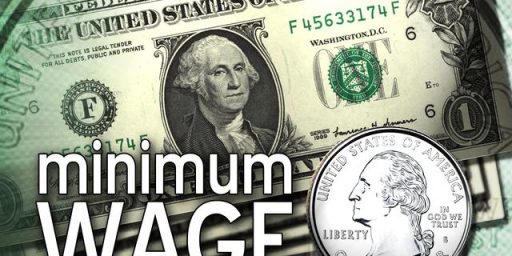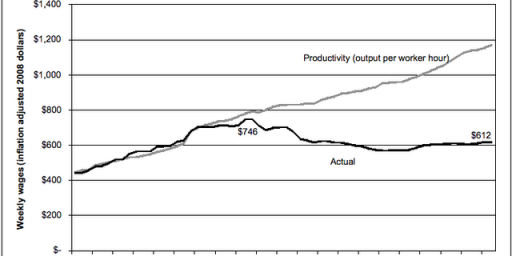Some Economic Thoughts on the Border Wars
On my ride into work in the mornings I sometimes have the radio tuned (for a few minutes till I change the channel) to KABC 790’s Doug McIntyre’s show. One of the things that makes me grind my teeth in frustration is the economic ignorance of radio show commentors. For example, McIntyre will routinely rant on about how illegal immigration is ruinging the American way of life. The increased competition is lowering wages in some markets and forcing Americans to either seek employment elsewhere or to accept lower wages, or a combination of the two. Now what sets me to grinding my teeth is that McIntyre then goes on to advocate not only shutting down the border crossings (which I tend to support from a national security view point) and deporting current illegals in the U.S., but that it will be good for the economy.
Why will it be good? Wages for Americans will rise. Well if that is all it takes why not advocate legislation that simply raises the wage. Here it would be a simple law: All current wages in the U.S. are not, by governmental dictate, raised $10/hour. Done. Economic nirvana here we come. What…you just spewed your favorite drink all over your monitor at the silliness of this notion? Well it is the same thing that Mr. McIntyre and those who think like him advocate.
Basically, McIntyre’s argument is to restrict competition in various labor markets. That is to limit the number of suppliers (i.e. workers). Whenever and wherever one restricts competiton two things almost surely happen.
- Prices rise,
- Output declines.
This isn’t some kind of highly technical economic theory. It can be seen from a simple supply and demand graph where the supply curve is shifted inwards. This kind of thing is also usually associated with reductions in welfare. After all, we don’t encourage monopoly and oligopoly generally speaking as market outcomes. These are viewed as bad things in that they…raise prices and decrease output (and in the case of monopoly comes with a deadweight loss). We also, don’t usually consider it a good thing when legislation is enacted that reduces competition for the very same reasons.
Now there is another component to the anti-illegal immigration stance and that is that illegal immigrants also avail themselves to publicly provided goods and services (i.e. services and goods that are provided by the government and paid for with tax dollars, and not to be confused with public goods). So there is the possibility that by removing these costs from the public sector could offset the losses from the private sector. Still this is an empirical question and one I don’t trust McIntyre et. al. to determine (not because I think they are dishonest, but because I don’t think they are capable of doing such research…he is a radio show host after all). Still, another option is to simply restrict these public services wherever possible to citizens. Still this is likely to be unsuccessful in that it will be deemed racist and/or unconstitutional.1
So it is incoherent, in my view, for one to say on one hand we need to protect the American way of life and limit illegal-immigration to protect American wages and on the other to be against free trade and the minimum wage. The same arguments apply to both free trade and the minimum wage. In fact, it is a pretty anti-market position to take. I can see limiting border crossings for national security purposes, but the economic arguments are almost always based on sloppy reasoning.
_____
1Another black mark against the judicial activism of the 1930’s that allowed government to balloon to such gigantic proportions offering services and goods that were, prior to the 1930’s, seen as not being part of the government’s responsibility.






I can see limiting border crossings for national security purposes, but the economic arguments are almost always based on sloppy reasoning.
Right. The trick is figuring out how to separate the two. So long as advocates of border control for national security are confounded in the public mind with nativists, this will be very difficult. It would help if there was a long tradition of honesty in public debate, and particularly of avoiding straw men and other dishonest restatements of the other guy’s position. Maybe on some other planet.
I’m afraid that all the anti-illegal-immigration people start to sound alike at some point: “an’ another thing; an’ another thing, an’ another thing.” The most reasonable part of the argument (the security issue) appears buried in a mound of nonsense.
They never sound like they’re really trying to persuade anyone who doesn’t already believe what they believe. And there is–I’m sorry–a really icky undertone to the whole thing. One always hears a certain percentage of people calling in to these radio talk shows on the subject who just hate Mexicans. And I’ve never heard the hosts rein the racists in, either.
I like McIntyre on a lot of issues, but on immigration he just sounds insane to me.
Uh, we’re talking about “illegal” workers, right?
There are laws in place, which simply are not enforced. Let’s enforce the law, and see what things look like then.